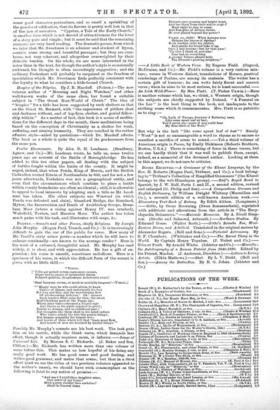POETRY. — Sonnets and other Poems, chiefly Religious. By Joseph John Murphy.
(Kegan Paul, Trench, and Co.)—It is increasingly difficult to gain the ear of the public for verse. How many of Mr. Traill's sixty minor poets—a number which he will have to enlarge continually—are known to the average reader P Here is the work of a cultured, thoughtful mind. Mr. Murphy has read widely, it is clear, and with appreciation. He has a gift of ex- pression; his verse is smooth, sometimes melodious. Here is a specimen of his verse, in which the difficult form of the sonnet is given with no little skill :—
" Viaors.
[' Felix qui potnit rerum cognoscere camas, Atone metus omnes et inexorabile fatum Subjecit pedibna, strepitumque Acherontis avari.'
'Bunt lacrymm rernm, et mentem mortalia tangunt.'—Vnion..] "Happy were he who could attain to know Causes of things, and underneath his feet Set fear and fate, and the unretnrning flow Of all-devouring Acheron.' Oh! nnmeet Such tearless Stoic calm for thee, the sweet Half-Christian poet of the Pagan age, Whom later times esteemed a wizard sage And Dante as his guide rejoiced to greet ; Tender as woman, and as childhood pure!
Not thoughts like those shall in his mind endure Who learns aright the lore thy genius brings; But human sympathy for human woe ; And words of thine which tell that 'tears must flow, And hearts of men are touched by mortal things.' "
Possibly Mr. Murphy's sonnets are his best work. The task puts him on his mettle, while the blank verse, which demands less effort, though it actually requires more, is inferior.—Songs of 17nirersal Life. By Marcus S. C. Rickards. (J. Baker and Son, Clifton.)—Mr. Rickards has written more than one volume of verse before this. This makes us less hopeful of his doing any really good work. He has good sense and good feeling, and writes good grammar, and metre that scans; but that in a third effort (and we see the titles of two previous volumes appended to the author's name), we should have such commonplace as the following is fatal to any notion of promise :—
"And mail I yield thee, daughter mine, Fair jewel of my home ? Must a grey cloister thee enshrine ? Shall its funeral dome Entomb rare promise and bright hope. And bar them from their native scope ? Must right to stay or roam, And free play of diviner dower.
Be ever placed beyond thy power ?
Forget me, child ! What Autumn tree
Retains the leaves of Spring?
Each warbler stills his jubilee,
And marks his brood take wing.
Once I had dreams-but let that pass!
'Tis thee I think of, and alas!
Fear lest in everything A gloomy Future should belie The Present's glowing prophecy."
—A Little Book of Western Verse. By Eugene Field. (Osgood, McIlvaine, and Co.)—Mr. Field's volume is a very curious mix- ture ; verses in Western dialect, translations of Horace, poetical renderings of Psalms, are among its contents. The writer has a certain gift of humour; he can write fairly fluent and correct verse ; when he aims to be most serious, he is least successful.— An Irish Wild-Flower. By Mrs. Piatt. (T. Fisher Unwin.)—Here is another volume which has, we think, a Western origin, though the subjects are chiefly suggested by Ireland. "A Funeral on. the Lee" is the best thing in the book, not inadequate to the striking scene which it commemorates. Mrs. Piatt is so patriotin as to sing :— " Oh, Lark of Europe, downwai d fluttering near,
Like some spent leaf at best,
You'd never sin, again if you could hear
My Blue-Bird of the West."
But why is the lark "like some spent leaf at beet"? Surely "West" is not so unmanageable a word to rhyme as to excuse so manifest a sacrifice of sense to sound.—Yet a third volume of American origin is Poems, by Emily Dickinson (Roberts Brothers, Boston, 'U.S.A.) There is something of force in these verses, but we can hardly think that it was well to publish them, except, indeed, as a memorial of the deceased author. Looking at them in this aspect, we do not care to criticise.


































 Previous page
Previous page